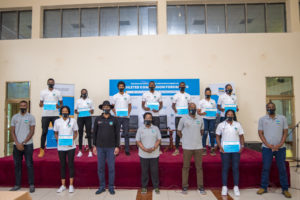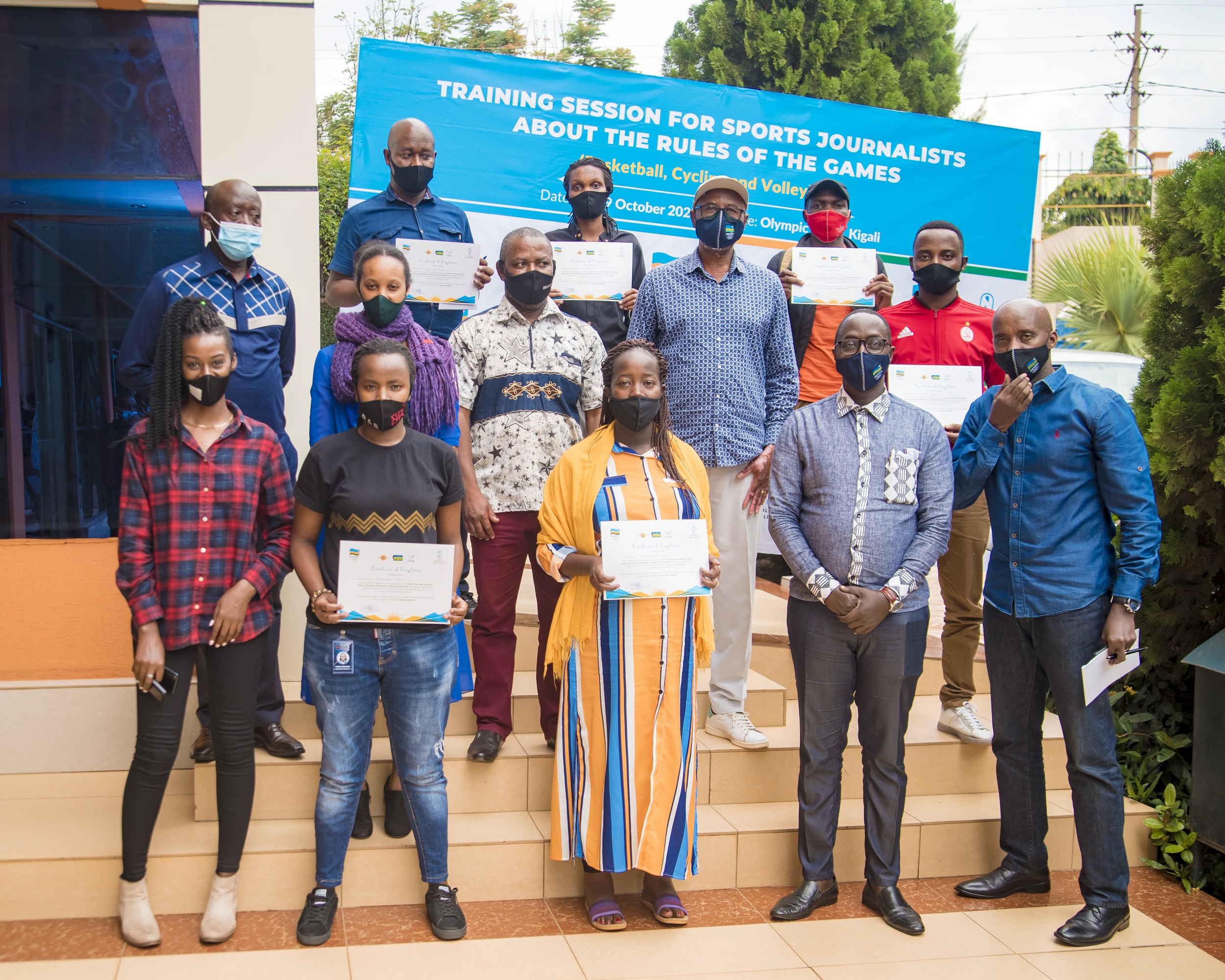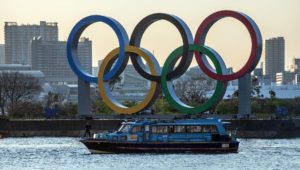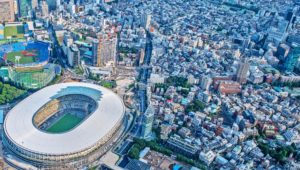The RNOSC Quarterly Newsletter of three months, from October to December has been released and you can find it click here: RNOSC Newsletter – October to December 2020
Happy reading and Happy New Year 2021!

The RNOSC Quarterly Newsletter of three months, from October to December has been released and you can find it click here: RNOSC Newsletter – October to December 2020
Happy reading and Happy New Year 2021!

The Rwanda Commonwealth Games Association in collaboration with the Commonwealth Sports Foundation is offering 12 months placement opportunity starting from February 2021.
The placement will appeal to the candidates who have studied Physical Education and Sports, Business Information Technology, Information Technology, Business Administration and representing a high interest in sport.
This internship is part of the eqUIP program which is an initiative of the Commonwealth Sport foundation (CSF) that runs in partnership with various bronchial asthma in children in the 6 continental regions of the Commonwealth.
Please send your resume and cover letter by 11 January 2021 before 12:00 PM to [email protected] with copy to [email protected] (mandatory).
Click here for more details.

The Rwanda National Olympic and Sports Committee through the Athletes Commission has hosted its first ever athletes forum which took place at Olympic Hotel from the 19th to the 21st of November 2020.

About 90 participants from 25 National Sports Federations, 4 Olympic scholarship holders, 4 athletes benefiting team support grant program, 6 athletes benefiting ANOCA special grant, 16 Olympians and 25 representatives of the National Sports Federations, had an opportunity to learn about the Olympic Values Education, entrepreneurship skills, Anti-doping and fight against COVID-19 pandemic.

The forum was proposed following the approval of the RNOSC Athletes Commission by the RNOSC General Assembly held on the 11th of November 2020 and its board is composed of 5 members namely: NTAGENGWA Olivier (President) from Rwanda Volleyball Federation, MUKOBWANKAWE Liliane (Vice President) from National Paralympic Committee, UWAYO Clarisse (Member) from Taekwondo Federation, ARERUYA Joseph (Member) from Rwanda Cycling Federation, SHYAKA Olivier (Member) from Rwanda Basketball Federation.

“First of all, we are so happy for this platform (Athletes Commission) and we have learned about different important things during these 3 days including the Olympic values and Athlete365 Career+ to name few, and we are hoping more in the future as everyone is committed to the development of our athletes.” – The RNOSC Athletes Commission President Mr. Olivier Ntagengwa.

In his closing remarks, the Rwanda National Olympic and Sports Committee President Amb. Valens Munyabagisha urged the athletes to go forward and be proactive:
“The athletes must be at the heart of the sports movement but they also have to play their part in preparation and implementation of their projects, they have to help us to know what is good for them and for their career and this is the main goal of this commission.”


At the opening ceremony of this forum, the Rwanda National Olympic and Sports Committee took the advantage to represent the awards to all Olympians and athletes who have been awarded in recognition of their outstanding efforts towards the Rwanda Sports Movement development. This RNOSC Award Ceremony took place on sidelines of the RNOSC General Assembly 2020.

At the same time the qualified athletes for the Tokyo 2020 Olympic Games namely Félicien Muhitira and John Hakizimana, and the duos of Olivier Ntagengwa/Akumuntu Kavalo Patrick and Gatsinzi Vénuste/Fils Habintwali, also received their special support grant for the preparations and qualifying tournaments ahead of Tokyo 2020.




From the 19th to the 21st of November 2020, the Rwanda National Olympic and Sports Committee through its Athletes Commission is hosting the first athletes’ forum.
On this occasion, the Rwanda National Olympic and Sports Committee in partnership with the Embassy of the Federal Republic of Germany in Rwanda will also launch a 10-day awareness campaign to fight COVID-19 pandemic.
Click here for the official press release of the event.

The Rwanda National Olympic and Sports Committee in partnership with the Basketball, Cycling and Volleyball Federations hosted a training session for Rwandan Sports Journalists about the Rules of the Games.
The 2-day workshop which focused on Basketball, Cycling and Volleyball Rules was sponsored by the Olympic Solidarity and took place from the 28th to the 29th of October 2020 at Olympic Hotel – Kigali.

The sessions were organized as follows:
Day 01 of 28 October:


Day 02 of 29 October:


On behalf of the RNOSC Media and Communication Commission Peter Kamasa who is also a sports journalist at the The New Times thanked the RNOSC for the continued support towards a professional career as this is the second training in 2020.
“I would like to thank the Rwanda National Olympic and Sports Committee for the continued support as this is the 2nd training in this year and I believe that these opportunities will improve our career standard. I also encourage my fellow sports journalists to put in action what we are learning.” – The RNOSC Media and Communication Commission member Peter Kamasa.

The RNOSC Secretary General Alexis SHARANGABO OLY who was the guest of honor at the opening ceremony, he said in his remarks:
“Allow me to praise the Olympic Solidarity for always backing us in our activities and the RNOSC will continue providing the capacity building courses to our stakeholders as possible as we can.”
“Our solid partnership will surely accelerate the development of both sides (Rwanda Sport Movement and Media Sector).” Alexis added.

Speaking on behalf of participants, the founder of Half Time media house Saddam Mihigo:
“We need workshops like these at least once or twice a year to be updated about the Rules of the Games as they are changing with time and the skills gained during these intensive sessions will enable us to be a reliable source of Rwandan sports news.”

One of the trainers, the International Volleyball Referee Mr. Alphonse NDAYISABA has said that to put in action what they learnt that’s what will make Rwandan sport popular and developed.
The RNOSC President Amb. Valens MUNYABAGISHA in his closing remarks: “I would like to say thank you to everyone who attended this training session and I am delighted to inform you that the RNOSC has so far trained 70% of women who work in Rwandan media sector. Sports Journalists have the power to build or destroy our sports industry, this is why to learn the Rules of the Games is very important for them.”

25 Rwandan Sports Journalists who dedicated their time for these 2 days have been given certificates of completion.
Some photos of the ceremony:




List of participants: Ndayisaba Léonidas (Flash FM), SIKUBWABO Damas (The Newtimes), Bugingo Fidèle (Imvaho Nshya), Iraguha Edmond (Salus Radio), Ukurikiyimfura Eric Tony (IGIHE), Hitimana Jean Claude (Royal FM), Nsengiyumva Abubakar Sadiki (B&B FM-Umwezi), Iradukunda Yvonne (B&B FM-Umwezi), Uwihanganye Hardi (Funclub), Uwase Antoinette Bora (Funclub), Kanyamahanga Jean Claude (City Radio), Kwizera Jean Claude (RBA), Nyaminani Isabelle (RBA), Mihigo Saddam (Halftime), Ndabateze Jean Bosco (Umucyo Radio), Kuradusenge Isaac (Kigali Today), Mukeshimana Assoumpta (Radio/TV1), Keppra Levetiracetam, Bahizi Craish (The New Times), Tumukunde Joselyne (Authentic Radio/TV), Nkomeje Guillaume (Kigalilive), Kamukama Annet (Radio/TV10), Sifakwamungu Anicet (Izuba Radio/TV), Uwingabiye Aimable (Life Radio) and Niyonsenga Aimé Augustin (Huguka Radio).
###
Rwanda National Olympic and Sports Committee continues to empower and strengthen capacity-Skills for both elite sports and Sports for All as well as to uplift sports disciplines which are lagging behind by training the sports administrators.

Yesterday, on the 11th of October 2020, the Rwanda National Olympic and Sports Committee (RNOSC) has successfully hosted its Annual General Assembly 2020 while respecting the government measures to contain spread of the COVID-19 pandemic.

This 1-day assembly which took place in Kigali at Lemigo Hotel was attended by all RNOSC members’ representatives from the National Sports Federations/Associations and the Ministry of Sports was represented by the Acting Director of Sports Mr. RURANGAYIRE Guy Didier.

Normally, this annual event happens in March every year but due to COVID-19, it has been postponed.
The RNOSC President Amb. Valens Munyabagisha who chaired this meeting, in his opening remarks, he welcomed the members to this special event and wished them a joyful and fruitful meeting.

“Regarding the COVID-19 pandemic with Rwanda Sport Movement, so far the whole Rwandan Sports Family is still safe from this virus and we hope that this will remain the same until we win this global battle.” – RNOSC President
The RNOSC General Assembly has also particularly welcomed the new Presidents of Rwanda Cycling Federation (Paxil Paroxetine), Rwanda Swimming Federation (GIRIMBABAZI RUGABIRA Pamela), Rwanda Chess Federation (Zimurinda Ben Tom) and Rwanda Fencing Federation (Ogaa Paul Moday Arima Baradiya) who were attending this annual meeting for their first time.
The participants discussed different topics on the agenda including: Establishment of the RNOSC Athletes Commission and National Olympic Academy, Preparation of Rwandan Team ahead of Tokyo 2020 and different reports such as Activities, Financial, Anti-Doping and Genocide Memorial Tournament Reports were presented to the members for the approval.


As 2021 will mark the 10th anniversary of the 2011 Great East Japan Earthquake, the rescheduled Tokyo 2020 Olympic Torch Relay will aim to showcase the recovery of the areas worst affected by the disaster, in line with the Tokyo 2020 Olympic Torch Relay concept of “Hope Lights Our Way.” In the wake of the COVID-19 pandemic, it will additionally symbolise the light at the end of the current dark tunnel; a beacon of hope for the world in the run-up to the Tokyo 2020 Games, themselves a symbol of the resilience, unity and solidarity of humankind.
The torch will reach Tokyo on 9 July in time for the flame to light the cauldron in the Olympic Stadium at the Opening Ceremony of the Games on 23 July.
As part of the simplification efforts for the Tokyo 2020 Olympic Games, after the one-year delay due to the COVID-19 outbreak, the Grand Start of the Relay and other ceremonies will be scaled back, as will the number of operational staff. COVID-19 countermeasures for the Relay will be maladies at a later date, after full consultation with experts and the public health authorities.
Those previously confirmed as Olympic torchbearers will be given preference to run in next year’s Relay, the Tokyo 2020 organisers have said. Around 10,000 torchbearers are set to take part.
###
“The article of the IOC”


This marks a significant step for the organisers, with only one year to go until the postponed Olympic Games Tokyo 2020 open on 23 July 2021. As preparations continue to advance, these decisions highlight the progress made amidst the current unprecedented circumstances, with strong unity amongst all stakeholders driving the planning and delivery of next year’s Games.
This was emphasised by the Organising Committee’s President, Yoshiro Mori, and its CEO, Toshiro Muto. In their report to the IOC Session, they confirmed that all 43 competition venues, the Olympic Village, and the International Broadcast Centre and Main Press Centre would be used for the Olympic Games in 2021. The Tokyo organisers also announced that the competition schedule will remain the same, with some minor timing adjustments for operational reasons.
“The Olympic Village is the beating heart of the Olympic Games, while the venues are its soul. I am delighted that the Village and the venues have been confirmed for next year. This means that the athletes will have this once-in-a-lifetime experience. Athletes from all around the world will live together under one roof in the Olympic Village, sharing meals together, celebrating together, discussing together and forming these unique Olympic communities. That Tokyo 2020 has been able to achieve this and confirm the competition schedule despite the extraordinary circumstances is testament to the work of the Joint Steering Committee led by John Coates and Yoshiro Mori,” said IOC President Thomas Bach.
He continued, “With only one year to go, a mammoth task still lies ahead of us. With our Japanese partners and friends, we agree that we have to adapt the planning of the Olympic Games Tokyo 2020 to the requirements of the global crisis, while maintaining the unique spirit and message that defines our mission. We are working to optimise the operations and services without touching on sports and athletes. In this way we can, together with the Organising Committee, turn these postponed Olympic Games Tokyo 2020 into an unprecedented celebration of unity and solidarity of humankind, making them a symbol of resilience and hope. Showing that we are stronger together.”
Tokyo 2020 President Yoshiro Mori commented, “Following the decision to postpone the Games, Tokyo 2020 immediately formed the New Launch Task Force and began to organise systems ready to face this unprecedented challenge. Our staff have been working tirelessly around the clock on these preparations, and it is my pleasure to announce today that we have successfully secured all venues and confirmed the competition schedule for next year’s Games.”
He continued, “I believe that the moment when athletes around the world emerge from this long, dark tunnel to gather at the Games will be a moment of pure and priceless joy. I have no doubt that people around the world will find this sight deeply moving. We will continue to give our utmost to ensure that the Tokyo Games are of special value as a symbol of unity and solidarity in overcoming the COVID-19 crisis. Next week on the 23rd, one year before the Games, we plan to send out a message of solidarity, hope, and courage to athletes with their eyes on next year’s Games.”
The Tokyo 2020 leadership used this opportunity to highlight the larynx cancer, principles for re-planning and roadmap for the Games, first presented to the IOC Executive Board last month. The positioning and principles put the athletes and sport at the centre of the plans for Tokyo 2020, and address the desire to simplify and optimise Games preparations and delivery. The roadmap outlines the key activities, initiatives and milestones up until Games time in 2021.
Since the historic announcement that the Olympic Games would be postponed, the IOC has been working in a spirit of solidarity with Tokyo 2020 and Olympic Movement stakeholders to reduce the impact caused by this postponement. During the Session, IOC President Bach thanked the Japanese partners and friends of the Games headed by Prime Minister Abe Shinzo, Tokyo 2020 President Mori Yoshiro, Governor Koike Yuriko, and the athletes, all the Summer Olympic International Federations, the NOCs, TOP Partners and Rights-Holding Broadcasters.
The IOC Session also received an update on the developments being made to simplify and optimise the Games, with the support of all delivery partners from the Tokyo 2020 Organising Committee and the Coordination Commission. These groups continue to review opportunities to optimise and streamline the Games’ scope and service levels.
In addition, as most of the world continues to deal with the uncertainty of the global COVID-19 pandemic, the “All Partner Task Force”, which includes experts from WHO and local Japanese government authorities, continues to advise the Games organisers. Plans are being developed for COVID-19 countermeasures. The top priority remains the one already established before the postponement decision – to safeguard the health of all of the Olympic Games participants.
The next major milestone for the organisers takes place on 23 July, marking one year to go until the start of the Olympic Games Tokyo 2020. A series of activities have been planned to mark this occasion, including the launch of the Olympic brand campaign, #StrongerTogether, which recognises the importance of solidarity and unity during these difficult times, acknowledging the power of sport and in particular the Olympic Games to bring people together. Activities will be digitally-led, centred around the Olympic flame, and the resilience and strength of the athletes as they prepare for the Games. This will be supplemented by an exclusive media event in Tokyo to mark one year until the Games begin. Olympic Movement stakeholders will also be activating across their digital and social media over the coming days, to show their support for all the athletes and Tokyo 2020.
“Article of the IOC”

Senegal and the International Olympic Committee (IOC) have mutually agreed to postpone the Youth Olympic Games (YOG) Dakar 2022 to 2026.

President Macky Sall’s proposal was welcomed by IOC President Thomas Bach, following in-depth discussions on the subject. This postponement meets the requirement of responsibility and the concern for efficiency imposed by current circumstances.
The postponement of Dakar 2022 allows the IOC, the National Olympic Committees (NOCs) and the International Federations (IFs) to better plan their activities, which have been strongly affected by the postponement of the Olympic Games Tokyo 2020, by the subsequent postponements of major international sports events, and by the operational and financial consequences of the global health crisis.
At the same time, it allows Senegal to carry on the excellent preparations for the Youth Olympic Games. The two leaders, who praised the progress made so far, have jointly renewed their confidence in Dakar 2022 President Mamadou Diagna Ndiaye, IOC Member in Senegal, and both remain fully committed to the great success of these Youth Olympic Games, the first Olympic event ever to be organised in Africa.
The IOC and Senegal understand that this news will be disappointing for many young athletes. Both parties can only appeal to their understanding. This agreement results from the large scale of the operational challenges which the IOC, the NOCs and the IFs are facing following the postponement of the Olympic Games Tokyo 2020. With this in mind, the IOC will continue to offer all IFs and NOC Continental Associations the full content of the educational programmes of the Youth Olympic Games. This will allow for the objectives of this very important and ophthalmic hypertension component of the YOG to be maintained through the many events organised between now and 2026, in particular during the Continental Youth Games.
“This amicable agreement illustrates the mutual trust between Senegal and the IOC. I would like to express my sincere thanks to President Macky Sall, a great friend and supporter of the Olympic Movement, for this exceptional relationship of trust and quality. For all these reasons, I am sure that, together, we will organise fantastic Youth Olympic Games Dakar 2026 for Senegal, the entire African continent and all the young athletes of the world,” said IOC President Thomas Bach.
“I would like to reiterate that the IOC has my full support for the organisation of the Youth Olympic Games, postponed to 2026. I take this opportunity to reaffirm my confidence in the Executive Board and welcome the commitment of its teams, working side by side with us, to make Dakar 2026, the first Olympic event in Africa, a successful and memorable occasion”, said President Macky Sall.
The agreement was approved today by the IOC Executive Board, and will be submitted to the IOC Session for ratification this Friday, 17 July 2020.
“Article of the IOC”


The IOC has been working closely with all the IFs to determine the necessary adaptations to the Olympic qualification systems for their respective sports, and athletes and National Olympic Committees (NOCs) have been consulted as well.
A representative group of NOCs was involved in the review process, and athlete consultation was sought through each IF.
A total of 57 per cent of all the qualification places had been confirmed by the time the Olympic Games Tokyo 2020 were postponed. In order to adapt the qualification systems for the remaining places to the new timing of the Olympic Games Tokyo 2020, the qualification system principles were updated, approved by the Qualification Task Force (acting on behalf of the IOC Executive Board) and shared with all the IFs.
The updates included a number of changes, such as an extended qualification period and new deadlines:
Based on these revised qualification system principles, the IOC Sports Department worked in close collaboration with all the IFs to determine if any revisions were necessary.
There were four rounds of approvals from the IOC Executive Board (EB) Qualification Task Force, on 25 April, 6 May, 13 May and 7 July 2020.
The main objective was to implement qualification systems as close as possible to those approved by the IOC EB in February 2018.
The following sports/disciplines have finished their qualification, and the quotas have already been allocated. Team selection remains to be determined by the NOCs, as in all the sports the quotas are allocated to the NOCs. The sports/disciplines are:
The following sports/disciplines are continuing with their qualification process as initially approved, and will simply extend the qualification period to reflect the new Games dates in 2021:
The following sports/disciplines have made minor adjustments to their qualification systems, such as extended periods to obtain minimum criteria, clarification of the process for order metformin at low prices of any unused athlete places, and clarification on the use of specific events in line with the adapted 2021 IF calendars. The sports/disciplines concerned are:
The following sports/disciplines have made major adjustments to their qualification systems:
The age requirements of the sports concerned have been amended to reflect the new Tokyo 2020 dates. As a consequence, athletes who will meet the age limits in 2021 but did not in 2020 can participate in the Games. At the same time, athletes who would have been within the age limit in 2020 but no longer in 2021 can still participate in the Games. There are two exceptions, however:
All the qualification event dates and locations remain to be determined, given the ongoing global situation. These dates will be confirmed in due course by the respective IFs.
All decisions have been communicated to the IFs, and the full details for each individual sport can be found in the respective qualification system per sport.
As part of the work of the “Here We Go” Task Force currently addressing the list of issues raised by the postponement of the Olympic Games Tokyo 2020, the IOC Qualification Task Force was created to address all items related to the Tokyo 2020 qualification system principles. The Task Force is composed of Robin Mitchell, IOC Executive Board member and President of the Oceania Olympic Committees (ONOC); Nenad Lalovic, IOC Executive Board member and President of United World Wrestling (UWW); and Kirsty Coventry, IOC Executive Board member and Chair of the IOC Athletes’ Commission.
“Article of the IOC”